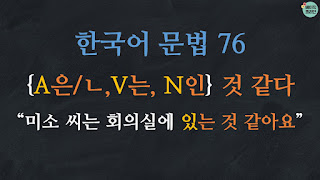Learn Korean: Korean Grammar 104: A/V-을지 모르겠다/ㄹ지 모르겠다
In this lesson, we're going to learn 'A/V-을지 모르겠다/ㄹ지 모르겠다.'
"나나 씨가 장미꽃을 좋아할지 모르겠어요."
(I'm not sure if Nana likes roses.)
🎬 Korean Grammar 104: https://youtu.be/2DtLrqyOswA
1. A Short Conversation (1)
- 미소: 영준 씨, 나나 씨 생일 선물 샀어요?
- 영준: 네, 장미꽃을 샀는데 나나 씨가 좋아할지 모르겠어요.
- 미소: 아마도 좋아할 거예요.
(in English)
- Miso: Youngjun, did you buy a birthday present for Nana?
- Youngjun: Yes, I bought a rose, but I'm not sure if Nana will like it.
- Miso: She will probably like it.
→ The grammar we're going to learn today is '좋아할지 모르겠어요.'
2. Usage
- '을지 모르겠다/ㄹ지 모르겠다' attaches after an adjective/verb stem.
- It is used to express that the speaker concerns or is worried about something because the speaker is not sure about something.
- It's usually used when you're worried about something in the future or something vague that hasn't happened yet.
3. Example Sentences
► 영준: 나나 씨가 장미꽃을 좋아할지 모르겠어요. (좋아하다 + ㄹ지 모르겠다)
(I don't know if Nana will like roses.)
- '좋아할지 모르겠어요' is a combination of the verb '좋아하다' and 'ㄹ지 모르겠다.'
- Youngjun bought a rose for Nana.
- But Youngjun doesn't know whether Nana likes or doesn't like roses. He is not sure. So he is worried.
- In this case, you can say '좋아할지 모르겠어요.' (I don't know if she likes it.)
► 미소: 나나 씨가 매운 음식을 먹을지 모르겠어요. (먹다 + 을지 모르겠다)
(I don't know if Nana will eat spicy food.)
- Here, '먹을지 모르겠어요' is a combination of the verb '먹다' and '을지 모르겠다.'
- Miso made spicy food. But she does not know if Nana will eat spicy food or not. So she is worried.
- In this case, you can say '먹을지 모르겠어요.' I don't know she will eat it.
3. Combination Information
- It attaches after an adjective/verb stem.
1) Final Consonant O: 을지 모르겠다
- When an adjective/verb stem has the final consonant, '을지 모르겠다' is used.
- 좋다 + 을지 모르겠다 → 좋을지 모르겠다
- 먹다 + 을지 모르겠다 → 먹을지 모르겠다
2) Final Consonant X: ㄹ지 모르겠다
- When an adjective/verb stem does not have the final consonant, 'ㄹ지 모르겠다' is used.
- 크다 + ㄹ지 모르겠다 → 클지 모르겠다
- 보다 + ㄹ지 모르겠다 → 볼지 모르겠다
3) Final Consonant ㄹ: (ㄹ 탈락) + ㄹ지 모르겠다
- When an adjective/a verb stem ends with the final consonant ‘ㄹ’
delete ‘ㄹ’ and attach ‘ㄹ지 모르겠다’.
- 멀다 (ㄹ 탈락) + ㄹ지 모르겠다 → 멀지 모르겠다
- 만들다 (ㄹ 탈락) + ㄹ지 모르겠다 → 만들지 모르겠다
4. Example Sentences
- 나나 씨가 집을 잘 찾아 올지 모르겠어요. (오다 + ㄹ지 모르겠다)
(I don't know if Nana will come to the house well.)
- 음식이 입에 맞을지 모르겠어요. (맞다 + 을지 모르겠다)
(I'm not sure whether you will like the food.)
- 동생이 수학 문제를 잘 풀지 모르겠어요. (풀다 (ㄹ탈락) + ㄹ지 모르겠다)
(I don't know whether my brother/sister solves the math questions well.)
5. A Short Conversation (2)
- 나나: 미소 씨, 이제 과제 발표해야 하는데, 준비됐어요?
- 미소: 네, 열심히는 했는데, 제가 잘할 수 있을지 모르겠어요. 너무 긴장돼요.
- 나나: 잘할 수 있을 거예요. 너무 긴장하지 말아요.
(in English)
- Nana: Miso, it's time to present your assignment, are you ready?
- Miso: Yes, I've been working hard on it, but I don't know if I can do well. I'm so nervous.
- Nana: You can do well. Don't be too nervous.
→ 잘할 수 있을지 모르겠다: 잘하다 + ㄹ수 있다 + 을지 모르겠다
- The grammar we've learned is '있을지 모르겠어요.'
- '있을지 모르겠어요' is a combination of '잘하다', 'ㄹ수 있다' and '을지 모르겠다.'
Thank you~!
#베이직코리안 #한국어문법 #Basickorean #Koreangrammar #을지모르겠다 #ㄹ지모르겠다
_basickorean.jpg)

